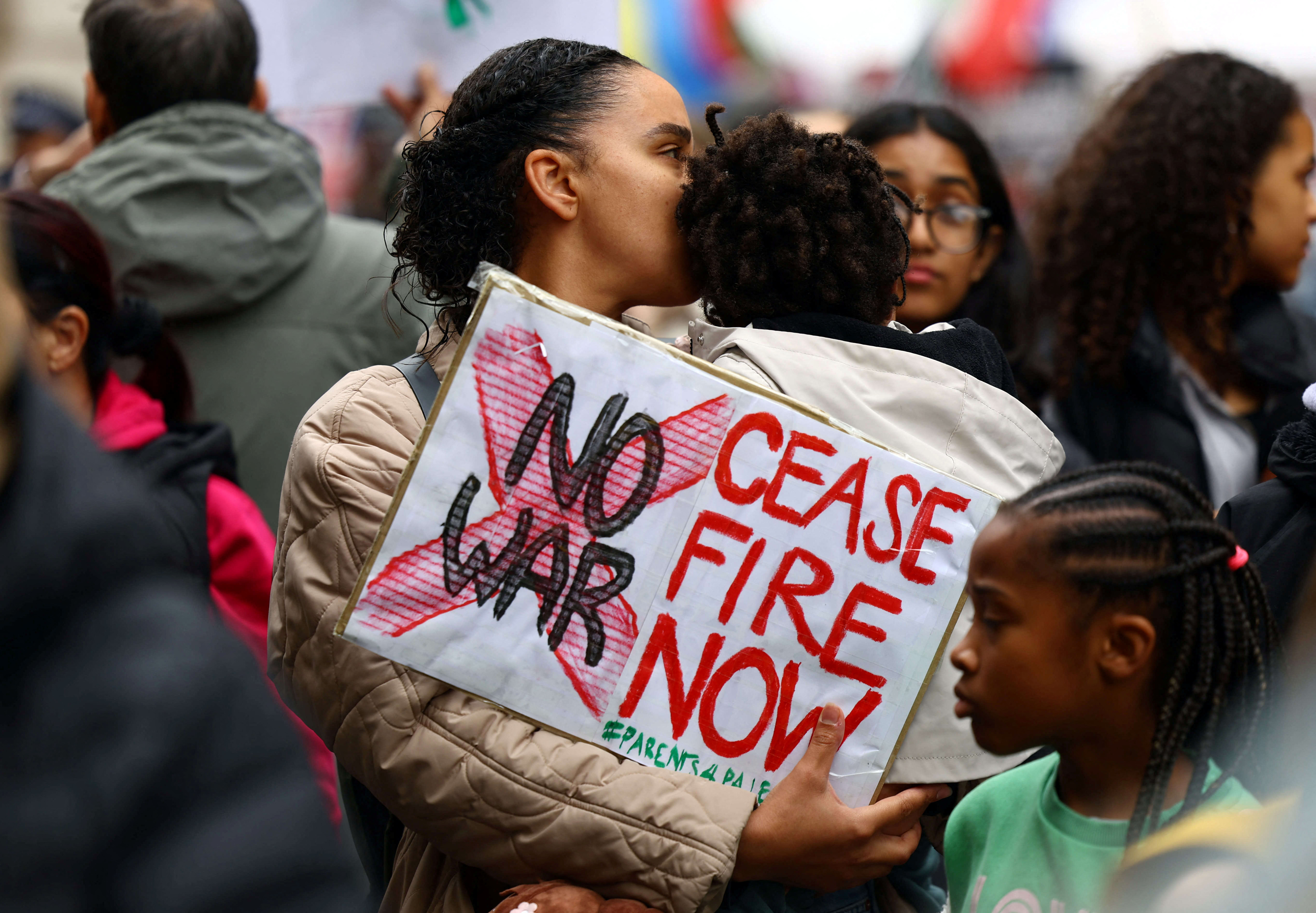Israel’s response to the Oct. 7th attack by Hamas has eclipsed the horror of that day.
Don’t Feel Sorry for the Gazans
Supporters of Israel sometimes say that the people of Gaza deserve collective punishment because they support Hamas, which carried out terrorist attacks against Israel. Setting aside the fact that Hamas was not elected, Americans should be careful about claims that terrorism by a government justifies violent retaliation against a civilian population.
DMZ America Podcast #131: Debating the Gaza War
In the latest DMZ America Podcast, editorial cartoonists Ted Rall (from the Left) and Scott Stantis (from the Right) explore the threat of the Israel-Hamas War spreading from Gaza, where 1% of the total population has been killed, to Iran, the Red Sea and Lebanon and beyond. Ted, who sympathizes with the cause of Palestinian emancipation, presses Scott, who supports Israel’s response to Hamas’ October 7th attack, on what line Israel would need to cross before he would consider them to have gone too far. It’s a tough debate, and a passionate one, but the guys manage to keep things civilized and productive enough to agree on what policy the U.S. should adopt toward the Netanyahu government in light of the flattening of Gaza and the humanitarian crisis.
Watch the Video Version of the DMZ America Podcast: Here.
The Final Countdown – 1/11/24 – South Africa Takes Israel to Court for War Crimes in Gaza
On this episode of The Final Countdown, hosts Angie Wong and Ted Rall break down topics from around the world, including South Africa
The Final Countdown – 1/5/24 – Iowa Caucuses Becomes Last Stand for Some Republicans
On this episode of The Final Countdown, hosts Angie Wong and Ted Rall talk about current events domestically and globally, including the Iowa Caucuses.
DMZ America Podcast #130: Another Ivy League President Fired, Israel Gone Wild and America’s 250th Birthday
In the first DMZ America Podcast of 2024, editorial cartoonists Ted Rall (from the Left) and Scott Stantis (from the Right) discuss the world in politics and current events.
First, Claudine Gay resigned as president of Harvard University after drawing criticism for failing to clearly condemn antisemitism at a Congressional hearing, and then being exposed as allegedly having plagiarized dozens of times in her academic career. Right-wing conservatives are celebrating having claimed a scalp and dealt a blow against DEI, but should liberals mourn her departure?
Second, Israel claims responsibility for the drone assassination of a leader of Hamas in a suburb of Beirut, Lebanon. On the same day, two bombs killed over 100 people attending a memorial service for an Iranian general assassinated by an American drone in 2020. Are the two events linked? Will there be repercussions in the form of a larger regional conflict?
Finally, we are coming up to the 250th anniversary of America. It’s anybody’s guess what it will be called.
Watch the Video Version of the DMZ America Podcast here.
Ceasefire in Gaza, An Offer Israel Can’t Refuse—Yet It Is

The Left is doing something right.
And it’s something that I initially disagreed with, even though I didn’t comment in a public space.
When Israel overreacted to Hamas’ October 7th attack on western Israel with a brutal saturation bombing campaign against the Palestinian civilian population of the Gaza Strip, defenders of human rights, antiwar activists and supporters of the Palestinian liberation movement demanded a ceasefire.
To me, that felt like yet another example of the Left settling for too little, negotiating against itself. Ask for the stars, I usually advise, and you might settle for the moon. Ask for the moon and you might wind up with nothing. A ceasefire isn’t an armistice, much less a peace agreement. It’s merely an interruption in a war. What kind of antiwar activist doesn’t ask for an end to a war?
One of the most famous examples is the Christmas Truce of 1914, when German and British troops crawled out of their trenches and met in no-man’s land to exchange presents, play soccer and celebrate the holiday together. A day or two later, however, World War I resumed. It’s a cute story that changed nothing.
Israel owes the people of Gaza nothing less than an immediate cessation of hostilities and official acceptance that the current conflict is a war crime for which top Israeli governmental and military officials should be prosecuted. The IDF should withdraw. Israel should pay to rebuild everything it destroyed and compensate the families of dead and wounded Palestinians. It should house everyone it has displaced on Israeli territory, in Tel Aviv and Jerusalem if need be. It should recognize a free and sovereign Republic of Palestine in Gaza and the West Bank, with East Jerusalem as its capital, within 1967 borders along with a safe corridor to connect the currently non-contiguous borders. The 700,000 settler-colonists should leave the West Bank and return to Israel.
A ceasefire seems so tiny by comparison.
Which is why it’s proving effective as a demand.
When people confront two parties engaged in a conflict, one of their first reactions is to try to assess which, if either, is right (or at least more right). This determination is affected by such cognitive biases as whether one side looks or acts more like the person making the assessment. In the Israeli-Palestinian conflict, some Americans have baked-in personal allegiances because they are Jewish or Muslim.
Which leaves the other 97% of the population. Citizens of the United States are notoriously ignorant about politics and cultures beyond their borders. To the extent that they pay attention to the Middle East conflict, there has been a historical bias in favor of Israel, a fact that Israeli Prime Minister Benjamin Netanyahu and his ally President Joe Biden relied upon at the beginning of the war in Gaza. As we have seen in the past, however, Israeli overreaction has prompted the public to take a closer look and, following the usual practice, led them to a “pox on both of their houses” stance. Deputy National Security Adviser K.T. McFarland repeated that trope in 2020 when she claimed on Fox News that in “…the Middle East, they’ve been fighting for 4,000 years. It’s been an ethno-sectarian battle and psychodrama, and they’ve been killing each other for millennia. Their normal state of condition is war.” (This is not even a little bit true, but let’s leave that for another time.)
20,000+ dead Palestinians into the latest episode of the conflict, the Gaza war has become a catastrophe too big to ignore or dismiss with glib inanities. Day after day, as Americans’ social media feeds fills with bloody images of dead Palestinian babies, initial public sympathy for Israel has given way to a feeling that the Palestinians of Gaza are victims at least as much as the Israelis of October 7th. Choosing sides is no longer easy. But one thing is clear: the carnage has gone on too long and, even if a long-term conclusion like a two-state solution is impossibly elusive, the bombing simply has to stop.
By mid-December, three out of five American voters—with few differences between political parties—supported a ceasefire, up significantly from October. The public had caught up to the pro-Palestinian activists. By not asking for much, the Left appears moderate and reasonable.
Meanwhile, voters keep reading headlines in which the Israeli government is refusing a ceasefire. To the contrary, Netanyahu says the war will continue for “many more months.” Israel is framing itself as rabid, overreaching and bloodthirsty.
Because it is out of sync with public opinion, good will for Israel is ebbing like the pulse of a man bleeding to death from a gunshot wound. Although older voters still tend to support Israel, a mere 28% of voters between ages 18 and 29 told the latest New York Times/Sienna College poll that they believed Israel was seriously interested in a peaceful solution. On the other hand, half said the Palestinians do want peace.
(Ted Rall (Twitter: @tedrall), the political cartoonist, columnist and graphic novelist, co-hosts the left-vs-right DMZ America podcast with fellow cartoonist Scott Stantis. You can support Ted’s hard-hitting political cartoons and columns and see his work first by sponsoring his work on Patreon.)
Victimhood or Vengeance? Israel Wants, But Cannot Have, Both

Victimhood or vengeance: choose one.
You can’t have both.
Israel is about to learn that. Supporters of Israel’s government (as opposed to Israel writ large, which includes millions of Israelis who distrust their government) ask: Why are so few people still talking about October 7th? “It is striking and in some ways shocking that the brutality of the slaughter has receded so quickly in the memories of so many,” U.S. Secretary of State Antony Blinken remarked in early November.
Hamas’ attack was vicious, claimed many victims and was so recent—how can it be that those pitiful “kidnapped” posters are falling so flat so soon?
Blame Netanyahu and his co-conspirators.
They chose vengeance over victimhood.
They had a choice. Instead of gleefully indulging themselves in an unseemly orgy of destruction and murder after Hamas killed 1,200 Israelis and took 240 as hostages, Israel’s far-right government might instead have embraced the role of victim: Weep. Express confusion. Witness the personal stories of the dead and the lost. Beg Hamas to return the people it had kidnapped.
No bombs, no invasion, no psychotic rants about “human animals” or officially-tolerated banners genocidally screaming “Zero Gazans” hanging from a bridge in Tel Aviv.
Turn the other cheek.
Precise violence would have been acceptable. A raid against Hamas’ leadership, say. A hostage rescue attempt.
Had Israel not attacked Gaza in a wholesale campaign so devastating that historians have already declared it one of the most destructive in the history of warfare, it would continue to enjoy the sympathy and support of a world which, before the IDF saturation bombing campaign began on October 8th, had abandoned the Palestinians and forgotten the brutality they’d endured at the hands of the Zionists. U.N. resolutions would currently be directed against Hamas, not Israel. The Palestinian liberation movement, theretofore dormant and close to dead, would be a non-entity. America would be as festooned with Israeli flags as it was with Ukrainian ones a year ago.
Victimhood comes with downsides. Like, you can’t ethnically cleanse a couple of million Palestinians you’ve always hated and whose land you’ve long coveted. You look weak.
Look, I get it. War is fun. It keeps you in office even/especially when you’re facing prison time for corruption. Not to mention 141 square miles of beachfront real estate—that’s a land grab far too tasty to pass up.
But vengeance too, Israel is learning, is not without its own costs.
Israel has the right and the duty to defend itself, but this is not that. We’re hearing this linguistic construction a lot, notably from careful politicians and pundits whom, pre-war, would have omitted the qualifier phrase. Even allowing for the president’s imprecise command of English, Joe Biden’s complaint about Israel’s “indiscriminate bombing” (using mostly American bombs) was remarkable.
Israel has used 2,000-pound “bunker buster” bombs to kill 20,000 Gazans and make 2 million homeless by transforming their territory into a wasteland, all while penning them inside a death zone subject to typhoid, cholera and mass famine because Israel refuses to permit food trucks to enter the territory which they have occupied and subjugated for decades. If October 7th was a horror, what Israel has wrought since is that horror hundreds of times over. There must easily be least 100,000 Palestinian bodies buried beneath countless piles of rubble.
We didn’t forget October 7th. Israel eclipsed the Hamas attack, erased it, sacrificed its survivor-hostages to its war so thoroughly that it intentionally shot three of them when they managed to escape. We’re following Israel’s lead.
The U.S. made a similar call after 9/11. I wouldn’t call it a mistake as much as a conscious decision. For the most part, with the exception of the mawkish “never forget” yellow-ribboned grief porn still adorning some police stations and oversized pickup trucks driven by a certain type of right-winger, Americans accepted the erasure of their 3,000 dead in exchange for the mindless purposefulness of Bush’s Global War On Terror, deployed in the post-Cold War period to justify everything from invading Afghanistan to arming Yemen against the Houthis.
Unlike our whiny Israeli allies, we Americans know better than to ask why the world forgot 9/11. We forgot 9/11. We made our choice and we kill with it. “We are all Americans,” Le Monde editorialized the day after; we replied thanks but no thanks, we’ll kill anywhere and everywhere and Freedom Fry you wimps. That much grace and class, we have: we own our thug life and we’re totally good with the fact that the world hates us more than ever.
Meanwhile, that giant ripping sound is Israel’s blank check being torn up.
The whining is what happens when you keep doing the same thing while the world is changing all around you and then complain about it.
Since 1948 Israel has had Big Bad Sam across the ocean to fund and arm them while running interference for them at the U.N., no matter how much Palestinian land they stole or how many Palestinians they killed. After October 7th they assumed they could keep doing whatever they wanted. Biden confirmed their assumption.
Nice run. It’s done now.
Israel no longer controls the narrative. It no longer matters that Al Jazeera is censored by American cable companies because its Gaza footage is now available on social media. Israel is no longer admired as a safe haven for Holocaust survivors because they are almost all dead and gone; for Millennials and Zoomers Israel is just another country, albeit an anachronistic, uncomfortable vestige of the settler-colonial era with a major stank of apartheid. Israel’s star is sinking.
Sympathy for the vengeful peaked out in the “Dirty Harry”-“Death Wish” 1970s, when violent retribution was expected, accepted and even admired following an unprovoked wrong. Lashing back is now as passé as old white men on a college campus.
Israel is a young country and like a teenager it wants to have things both ways, both to be loved and feared. Now that it has destroyed Gaza, love is off the table. If it is lucky, it will retain a few of its former allies as tolerant frenemies.
If you want to be admired now, you need to get yourself some victimhood status. Consider affirmative action, the politics of transgenderism and income tests for government benefits unrelated to poverty—societal benefits accrue to those perceived to have been oppressed, repressed, tortured, traumatized and brutalized by those with power, wealth and strength—the very definition of nuclear-power Israel’s status in the Middle East. After Palestinians exchanged their retributive PLO of the 1970s for an impotent PA under occupation, the global Left began to embrace their cause. October 7th, a shocking throwback to Munich and the Achille Lauro, might have shifted victimhood back to the Jewish state, at least for a time, had Netanyahu’s gang not rejected self-restraint in favor of ultraviolence and opportunism.
Israel, a nation whose architecture, general aesthetics and fashion is stuck in the 1970s, is paying the price for its failure to grasp 21st century reality:
It’s better to have people feel sorry for you than to be afraid of you.
(Ted Rall (Twitter: @tedrall), the political cartoonist, columnist and graphic novelist, co-hosts the left-vs-right DMZ America podcast with fellow cartoonist Scott Stantis. You can support Ted’s hard-hitting political cartoons and columns and see his work first by sponsoring his work on Patreon.)
Gaza Land Acknowledgement
Following the doctrine that it is easier to beg forgiveness than to obtain permission, Israel is engaged in the ethnic cleansing of the Gaza Strip, with a view toward annexing it. It’s not hard to imagine that, sooner rather than later, beach resorts will replace the 2.3 million Palestinians who have been killed or driven out of their homeland.




